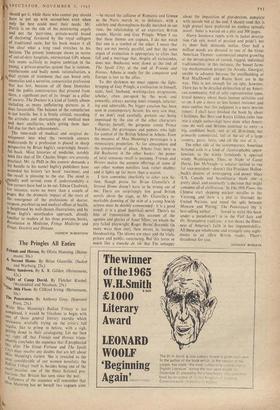The Pringles All Entire
Friends and Heroes. By Olivia Manning. (Heine-
Night of Camp David. By Fletcher Knebel. ti (Weidenfeld and Nicolson, 25s.) The Penetrators. By Anthony Gray. (Souvenir Press, 25s.) WITH Miss Manning's Balkan Trilogy at last completed, it would be frivolous to begin with
one of those general literary exordia which
reviewers, wistfully trying on the' critic's full regalia. like to primp in before, with a sigh,
betting down to their cataloguing. Let me then
'ay right off that Friends and Heroes trium- phantly concludes the sequence that (I prophesied this after The Great Fortune and The Spoilt (,:.113') must resolve any doubts that are left about hiss Manning's stature. She is revealed as the' most considerable of our women novelists; the U(Ilkan Trilogy itself is, besides being one of the most' massive. one of the finest fictional pro- duelions that Britain has seen since the war. Eollowers of the sequence will remember that Miss Manning has set herself two cognate aims —to record the collapse of Rumania and Greece as the Nazis march in; to delineate, with a subtlety and thoroughness hardly matched in our time, the relationship of an expatriate British couple, Harriet and Guy Pringle. When I say that these themes are cognate, I do not mean that one is a symbol of the other; I mean that they are not merely parallel, and that the same organ of evaluation is appropriate to cities that fall and a marriage that, despite all vicissitudes, does not. Bucharest went down at the end of The Spoilt City; at the end of Friends and Heroes, Athens is ready for the conqueror and Europe is lost to the allies.
To this darkness we must oppose the light- bringing of Guy Pringle, a civilisation in himself, saint, fool, husband, working-class progressive, scholar, often put-upon by the weak and cowardly, always nursing inner triumph, infuriat-, ing and admirable. No bigger creation has been seen in contemporary fiction; his very size may, if' we don't read carefully, prevent our being impressed by the size of the other characters - -Harriet herself, the gorgeous comic Prince Yakimov, the grotesques and pansies who light for control of the British School in Athens. Even the meanest of Miss Manning's personages is a stereoscopic projection. As for atmosphere and the composition of place, Athens lives here as did Bucharest in the other books: the power of total sensuous recall is uncanny. Friends and Heroes makes the autumn offerings of some of our other women novelists look rather shabby; and it lights up far more than a season.
1 turn somewhat churlishly to other new fic- tion, though praise for .Brian Glanville's A Second Home doesn't have to be wrung out of me. There are surprisingly few good British novels about the stage, so Mr. Glanville's re- markable donning of the skin of a young Jewish actress must be doubly commended: it is a good novel; it is a good theatrical novel. There's no hint of transvestism in this account of the agonies and glories of Janet Sayer, on whom the goy failed playwright Roger Burns descends (in More ways than one), then moves in, lovingly bloodsucking. The idioms are exact and the trials, private and public; convincing. But this tastes so much like a tranche de vie that I'm unhappy
about the imposition of plot-devices, complete with suicide bid at the end. I should (and this is high praise) have preferred an endless episodic novel: Janet is wasted on a plot and 300 pages.
Hurry Sundown repels with its jacket descrip- tion ('an epic novel of passion and pride'), but its sheer bulk demands notice. Over half a million words are devoted to one of the Great American Themes--commercial empire growling at the intransigence of cussed, rugged, individual traditionalists; in this instance, the Sunset farm- ing mechanisation project (in Arcady, Georgia), unable to advance because the smallholding of Rad MacDowell and Reeve Scott are in the way. This is not enough for an epic, however. There has to be detailed delineation of an Ameri- can community, full of salty representatiVe types, brutal honesty about basic human activities and so on. 1 am a more or less honest reviewer and must confess that this judgment is a mere interim report: I shall have finished the book by about ChriStmas. But Bert and Katya Gilden (who fuse into a single authorship) have done what Ameri- cans do well and Britons continue to envy--a big, confident book, not at 'all ill-written, not primarily commercial, full of the air of a large country, gusty, lusty, and all the rest of it.
The other side of the contemporary American fictional coin is a kind of claustrophobic appre- hension: to the windy farmlands is opposed windy Washington. Thus. in Night of Camp David, Jim McVeagh—a senator invited to run for vice-president--doesn't like President Hollen- ,hach's dreams of wiretapping and power blocs' (US, Canada and Scandinavia made one---a pretty idea). and eventually 'a decision that might consume all-of civilisation.' In The .?Sth Floor, the Chinese start shipping nuclear missiles to the Vietcong, and there is a plot to 'discredit the United Nations, and mend the split between Moscow and Peking.' The Penetrators (by 'a best-selling author . forced to write this hook under. a pseudonym') is in the Fail Safe and Dr. Strangelove tradition: a test shows the flimsi-' ness of 'America's faith in her impenetrability. All these are wholesome and strangely cosy night- mares to an . effete British reader. There's decadence for you..
SNTHONY BURC0,-;,,






































 Previous page
Previous page